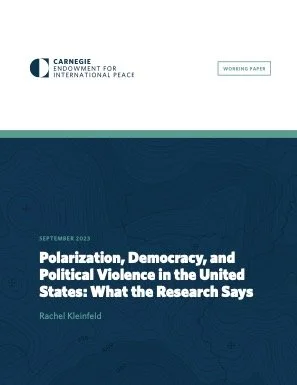By Rachel Kleinfeld
The United States feels roiled by polarization, and the philanthropic world is seized with debates about what to do. Some scholars claim that Americans are so polarized they are on the brink of civil war. Other polls suggest that voters agree on plenty of policies and that polarization is an illusion. Some philanthropists call for pluralism and civility, while others lean into activism, believing polarization is a byproduct of change toward a more just world. So, is the United States polarized or not? If it is, what is causing the polarization and what are its consequences? Should polarization be solved or tolerated? This paper is intended to answer these questions. It opens with five facts about polarization in the United States today and what those imply for possible interventions. A literature review follows, organized chronologically to explain the scholarly shift from thinking of polarization as an ideological, policy-based phenomenon to an issue of emotion, as well as the emerging understanding of polarization as both a social phenomenon and a political strategy. This paper is organized as follows. Part I: Introduction Five Facts About Polarization in the United States What This Understanding Means for Interventions Part II: The Literature on Polarization First Generation Understanding: Elite Ideological Polarization Polarization Is Policy Difference, and Congress Is the Problem How Was America Polarized? What Caused Elite Polarization? Interventions to Reduce Policy-Based Polarization Among Political Elites Second Generation Understanding: Mass Affective Polarization Polarization Is Emotional Dislike Based on Identity That Affects Regular People How Was America Polarized? What Is Causing Affective Polarization? Interventions to Reduce Affective Polarization Third Generation Understanding: Cracks in the Foundations Reducing Affective Polarization May Not Impact Violent or Antidemocratic Attitudes Antidemocratic Attitudes Political Violence Political Structures Affect Incentives to Polarize Part III: Conclusion What We (Think We) Know in 2023 Ideological Polarization Affective Polarization Washington, DC:
Carnegie Endowment for International Peace 2023. 74p.




